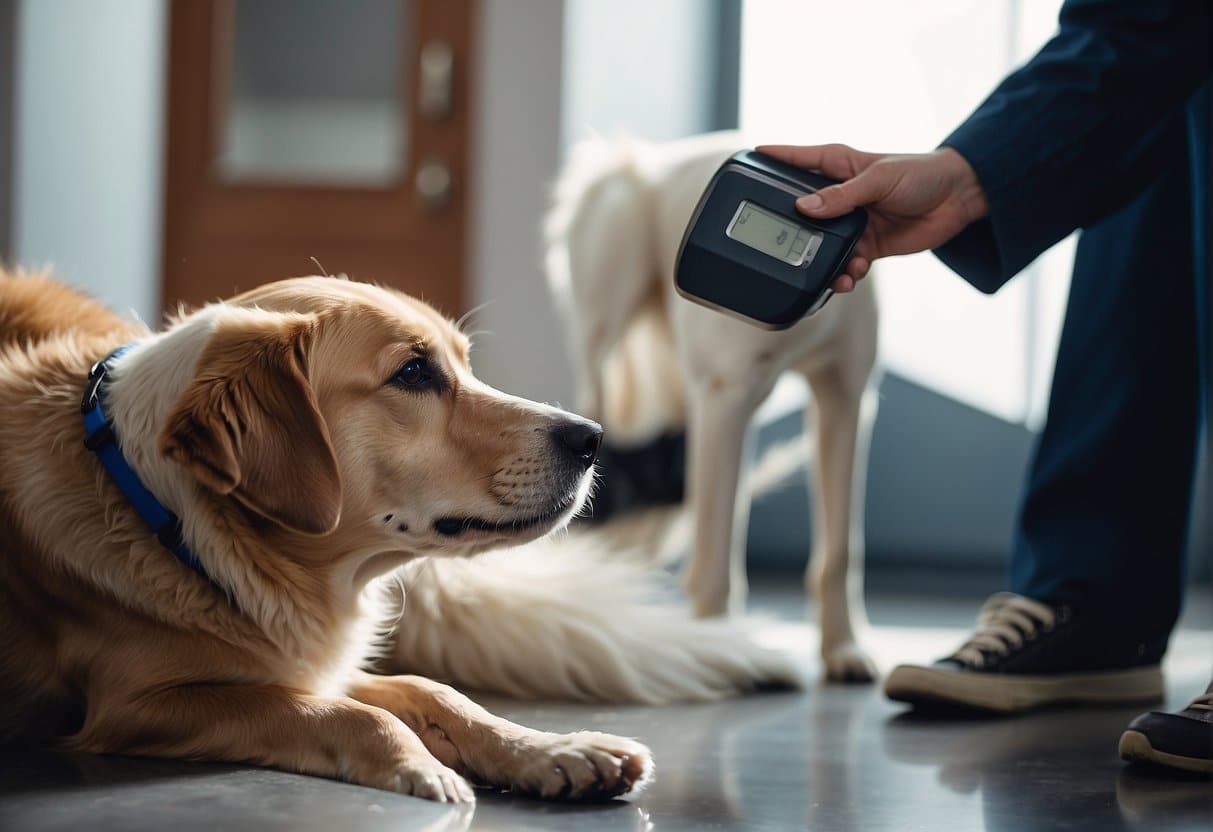
Seeing your dog vomiting white foam can be alarming. White foamy vomit is commonly caused by a buildup of gas and stomach acids, resulting in a frothy substance being expelled. This type of vomiting could be a one-time incident due to indigestion or it might be a sign of more serious health issues, such as pancreatitis, kennel cough, or even exposure to toxins.
Understanding what to look for and how to respond is critical in ensuring your pet’s health and well-being. Symptoms accompanying the vomiting, such as lethargy, diarrhea, or loss of appetite, can help determine the severity of the condition. It’s important to remember that while occasional vomiting might not signal a severe problem, persistent vomiting requires veterinary attention to diagnose and address any underlying issues.
Key Takeaways
- A dog vomiting white foam may indicate a range of conditions from indigestion to serious illness.
- Accompanying symptoms and the frequency of vomiting are key in assessing the seriousness.
- Veterinary consultation is crucial for persistent or severe vomiting episodes.
Understanding Dog Vomiting
When you notice your dog vomiting, it’s important to determine the cause and assess any accompanying symptoms. Vomiting can range from an isolated incident to an indication of a more serious condition that may require veterinary attention.
Causes of Vomiting in Dogs
- Ingestion of irritants: If your dog eats something that irritates their stomach, such as grass, trash, or toxic substances, vomiting can be a natural response for their body to expel the irritant.
- Diseases: More serious causes include diseases such as pancreatitis, kidney failure, or infections that affect the stomach or intestines.
- Bilious Vomiting Syndrome: This condition occurs when bile leaks into the stomach from the intestine, commonly resulting in vomiting in the morning or after a long period between meals.
Dietary indiscretion or changes: Sudden changes in diet or eating foods not suitable for dogs can cause upset stomach and vomiting.
Recognizing Symptoms and Associated Conditions
-
Assessment of Vomit: Dog vomit that contains white foam can sometimes be a sign of an empty stomach or excess gas. It could also indicate an inflamed stomach lining or the presence of stomach acids.
-
Accompanying Symptoms: If a vomiting episode is accompanied by symptoms such as a loss of appetite, lethargy, diarrhea, or signs of dehydration, it is crucial to seek veterinary care.
Remember to monitor the frequency of the vomiting and any other changes in behavior or appearance that may provide clues about your dog’s health.
Specific Conditions Leading to White Foamy Vomit
When your dog begins to vomit white foam, it can be symptomatic of several specific health issues, ranging from minor digestive system irregularities to more serious systemic health problems.
Digestive System Issues
Indigestion and Acid Reflux: Your dog may experience indigestion or gastroesophageal reflux, which can cause the vomiting of white foam. These are typically less severe conditions and can be related to your pet’s diet or eating habits.
-
Bilious Vomiting Syndrome: Occurs mainly in the morning or after a long period without food, leading to the vomiting of yellow or white foam due to the buildup of bile.
-
Inflammatory Bowel Disease: Dogs with this condition may occasionally vomit white foam, indicative of chronic irritation or inflammation in the gastrointestinal tract.
Gastroenteritis and Gastritis: Both are inflammations that affect the stomach and intestines, possibly leading to vomiting white foam.
-
Pancreatitis: Inflammation of the pancreas that can cause a dog to vomit foam, often accompanied by a hunched back or abdominal pain.
-
Intestinal Obstruction: Your dog might vomit foam due to a blockage in the intestine caused by ingesting foreign objects.
Gastric Dilatation and Volvulus (GDV)/Bloat: A severe and immediate medical condition where the stomach fills with gas and twists on itself.
Systemic Health Problems
Infectious Diseases:
- Kennel Cough: This respiratory infection might cause dogs to cough up white, foamy phlegm.
Kidney and Liver Disease:
-
Kidney Disease: This can lead to vomiting white foam due to the buildup of toxins in the blood that the kidneys fail to filter.
-
Liver Disease: It may also cause vomiting as the body attempts to expel substances that the liver cannot process.
It’s important for you to consult your veterinarian if your pet exhibits these symptoms, as timely diagnosis and treatment are crucial for the health of your dog.
Diagnosing the Underlying Cause

When your dog is vomiting white foam, pinpointing the exact cause is crucial. A veterinarian will start with a physical exam to assess your dog’s overall health and look for any signs of distress or abdominal pain. Medical history plays a key role, so be prepared to provide information on your dog’s diet, behavior, and any previous health issues.
Diagnostic testing is often necessary to get to the root of the issue. Here’s what you might expect:
- Blood work: This can reveal signs of infection, organ function, and blood cell counts.
- X-rays: These images can show foreign bodies, blockages, or abnormalities in the stomach and intestines.
- Ultrasound: This test provides a more detailed view of the abdominal organs and can help detect inflammation, growths, or other internal issues.
In some cases, additional diagnostic testing such as endoscopies may be recommended by your vet. These allow for a closer look inside your dog’s stomach and can also be used to collect tissue samples for biopsy.
Remember, each test plays a part in building a complete picture of your dog’s health. Your vet will use all the information gathered to determine the best course of action for treatment.
Treatment and Management of Vomiting
When your dog is vomiting white foam, it’s crucial to identify the appropriate treatment and management strategies to ensure their quick recovery and comfort.
Medical Treatments
If your dog is experiencing severe vomiting, emergency veterinary care is essential. Your vet may provide intravenous fluids to prevent dehydration and administer anti-nausea medication to control vomiting. For infections, antibiotics can be prescribed, while anti-inflammatories may be used to reduce any inflammation causing the vomiting. In some cases, hospitalization might be required to monitor your dog’s condition and provide supportive care.
Dietary Adjustments and Home Care
For home treatment, a bland diet such as boiled chicken and rice can be beneficial for your dog’s stomach. It is essential to slowly reintroduce a healthy diet after the vomiting has subsided to avoid further irritation. You should also ensure your dog has continual access to fresh water. If the condition is mild and your dog’s health is otherwise good, these home treatment options can be a suitable way to alleviate the symptoms and promote recovery.
When to Seek Immediate Veterinary Care

If your dog is vomiting white foam, it may indicate a condition that requires prompt veterinary attention. It’s essential to observe your dog’s overall behavior and look for additional symptoms that could signal an emergency. Here are specific circumstances when you should seek immediate care:
Obstruction or Foreign Body: If you suspect your dog has swallowed an object that could cause an intestinal blockage, such as toys or bones, this is an emergency. Symptoms may include prolonged vomiting and inability to keep water down.
Toxin Exposure: Vomiting foam can be a sign of poisoning. If your dog has been exposed to toxins, including toxic plants or chemicals, immediate care is crucial.
Serious Infections: Diseases like canine parvovirus and rabies are severe and can cause symptoms including vomiting. These require urgent veterinary intervention, especially in puppies and senior dogs who are more vulnerable.
Severe Illnesses: Conditions such as pancreatitis, cancer, respiratory disease, and pneumonia can manifest with vomiting among other signs. These are serious ailments that need a veterinarian’s assessment.
- Inflammation of the pancreas
- Infectious disease
- Cancer
- Respiratory disease
- Pneumonia
Extreme Weather Reactions: Heat stroke can cause vomiting and urgent care can be life-saving.
Trauma: If your dog has experienced any injury that could cause internal harm, such as being hit by a car or a fall, seek emergency care immediately.
Use the following information to recognize when your dog’s condition is an emergency:
- Continuous vomiting, especially if accompanied by diarrhea
- Blood in vomit or stool
- Lethargy or unresponsiveness
- Severe abdominal pain
- Difficulty breathing
- High fever
These signs can indicate a serious health issue, and your timely reaction can make a critical difference in the outcome for your dog. Remember, puppies and senior dogs may have weaker immune systems and be less able to cope with illness, making fast action even more significant. If in doubt, err on the side of caution and consult with your veterinarian or an emergency veterinary care facility.
Frequently Asked Questions
When your dog is vomiting white foam, it can be troubling. These FAQs address your concerns with straightforward and knowledgeable insights.
What should I do if my dog is throwing up white foam?
If your dog is vomiting white foam, monitor them closely for other symptoms such as lethargy or diarrhea. Offer small amounts of water and withhold food for a few hours. Consulting your veterinarian is advisable, especially if vomiting persists or is accompanied by other signs of illness.
What does white frothy vomit in dogs indicate?
White frothy vomit often signifies that your dog’s stomach is empty, except for gastric juices and air. This can happen with digestive upset or if your dog has eaten grass. But if this issue continues, it may point to more serious conditions like gastritis or a foreign body ingestion.
Could white foamy vomit be a sign of parvovirus in dogs?
White foamy vomit alone isn’t a definitive sign of parvovirus. However, if it’s accompanied by bloody diarrhea, severe lethargy, and loss of appetite, it could indicate parvovirus, especially in puppies. Immediate veterinary attention is crucial as parvovirus can be life-threatening.
Why is my dog vomiting white foam and refusing to eat?
Vomiting white foam accompanied by a refusal to eat suggests an underlying health issue. This could range from nausea and indigestion to more severe conditions like pancreatitis or kidney disease. If these symptoms persist, a visit to the vet is necessary for a proper diagnosis and treatment plan.
What are the possible treatments for a dog vomiting white foam?
Treatments vary based on the underlying cause. For mild cases, temporary fasting followed by a bland diet may be recommended. In more severe scenarios, treatment can include medications for nausea, IV fluids, or even surgery if a blockage is present. Always follow your veterinarian’s guidance for treatment.
Why is my senior dog vomiting white foam?
As dogs age, they’re more prone to health issues that could cause vomiting white foam, such as kidney failure or chronic conditions like gastritis. Regular veterinary check-ups are important to manage health problems in senior dogs effectively.
This article is provided for informational purposes only and is not intended to be a substitute for professional veterinary advice, diagnosis, or treatment. Always seek the advice of your veterinarian or other qualified health provider with any questions you may have regarding a medical condition or health concerns of your pet. Never disregard professional veterinary advice or delay seeking it because of something you have read in this article.





